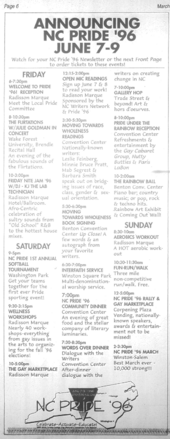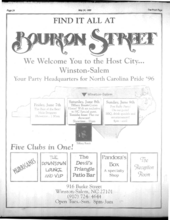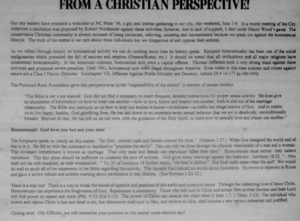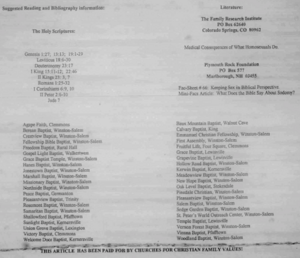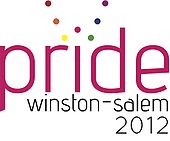Difference between revisions of "Winston-Salem Pride"
| (20 intermediate revisions by one other user not shown) | |||
| Line 1: | Line 1: | ||
| − | In 2011, the organization [http://equalitywinstonsalem.org/ Equality Winston-Salem] organized Winston-Salem Pride, a series culminating in a parade through downtown. Advertisements and reports of the event focused on the 15-year gap between the previous pride parade which occurred in 1996, yet there was little information on why there was a 15 year gap <ref>http://www2.journalnow.com/news/2011/oct/16/wsmain01-im-happy-with-who-i-am-ar-1504845/</ref> | + | This entry is part of: [[LGBT Identities, Communities, and Resistance in North Carolina, 1945-2012]] |
| + | |||
| + | |||
| + | In 2011, the organization [http://equalitywinstonsalem.org/ Equality Winston-Salem] organized Winston-Salem Pride, a series of events culminating in a parade through downtown. Advertisements and reports of the event focused on the 15-year gap between the previous pride parade which occurred in 1996, yet there was little information on why there was a 15 year gap.<ref>http://www2.journalnow.com/news/2011/oct/16/wsmain01-im-happy-with-who-i-am-ar-1504845/</ref> | ||
==NCPride 1996== | ==NCPride 1996== | ||
| − | [http://ncpride.org/pride/ NCPride], a state-wide organization promoting | + | <div style="margin-left: 750px">[[image:Schedule_of_Events.png|thumb|right|170px|upright|Schedule of events from ''The Front Page'']]</div> |
| + | [http://ncpride.org/pride/ NCPride], a state-wide organization promoting unity among and visibility of LGBT people, holds annual pride parades which used to change host cities before settling at Duke's East Campus in Durham in 2000. Winston-Salem was chosen as the host city for the 1996 parade. The organizers expected an attendance of 10,000 people, but police only half that based on previous parades. Parade attendees placed the figure somewhere between 5,000 and 10,000.<ref>Donald Patterson "Gay Pride march puts issues out in open," ''News and Record'', June 6, 1997</ref> | ||
===“Full menu of events”=== | ===“Full menu of events”=== | ||
| − | Cheryl Hopkins, a co-chairwoman of the parade and its associated events, wrote in a June 7th, 1996 article for the Winston-Salem Journal that one of the reasons for holding the parades is to “raise awareness within the community and begin a dialogue on gay issues.” The biggest issue in 1996 was the recently introduced Defense of Marriage Act (DOMA) in May. Hopkins doesn’t list any specific activities relating to DOMA, but there were many speakers, workshops, and dinners scheduled for the weekend where DOMA might have been discussed. | + | Cheryl Hopkins, a co-chairwoman of the parade and its associated events, wrote in a June 7th, 1996 article for the ''Winston-Salem Journal'' that one of the reasons for holding the parades is to “raise awareness within the community and begin a dialogue on gay issues.”<ref name= "Cheryl"> Cheryl Hopkins, "Celebrate: Gay parade offers full menu of events," ''Winston-Salem Journal'', June 7, 1996, D1</ref> The biggest issue in 1996 was the recently introduced Defense of Marriage Act ([http://thomas.loc.gov/cgi-bin/query/z?c104:H.R.3396.ENR: DOMA]) in May. Hopkins doesn’t list any specific activities relating to DOMA, but there were many speakers, workshops, and dinners scheduled for the weekend where DOMA might have been discussed.<ref>"Announcing NCPride '96 June 7-9", ''The Front Page'' March 29, 1996. 6</ref> |
=== “Celebrate, Activate, Educate”=== | === “Celebrate, Activate, Educate”=== | ||
| − | The motto for the 1996 parade, “Celebrate, Activate, | + | The motto for the 1996 parade, “Celebrate, Activate, Educate,” explains the goals for having a pride parade. Indeed, the weekend included a discussion by renowned authors Leslie Feinberg, Minnie Burce Pratt, Mab Segrest, and Barbra Smith. These authors spoke at an event entitled “Moving Towards Wholeness,” which promoted the bridging issues of race, class, gender, and sexual orientation. After the talk there was an after-dinner discussion about how to create change in North Carolina. |
=== Advertising=== | === Advertising=== | ||
| − | The parade was heavily advertised in the North Carolina gay publication The Front Page. As NCPride states on their website, the funding for the parades is based on advertising. Local businesses placed ads in The Front Page to attract the people from across the state. One business, Bourbon Street, took out a full page ad in the May 24th edition, advertising itself as “the party | + | <div style="margin-left: 750px">[[image:Bourbon_Street_Ad.png|thumb|170px|upright|Ad for Bourbon Street in ''The Front Page'']]</div> |
| + | The parade was heavily advertised in the North Carolina gay publication ''The Front Page''. As NCPride states on their website, the funding for the parades is based on advertising.<ref> http://ncpride.org/pride/about-us.shtml </ref> Local businesses placed ads in ''The Front Page'' to attract the people from across the state. One business, Bourbon Street, took out a full page ad in the May 24th edition, advertising itself as “the party headquarters.”<ref>"Find it all at Burbon Street", ''The Front Page'', May 24, 1996 24</ref> The increase in tourists during Pride weekend was beneficial to businesses who supported Pride by advertising in the newsletter. | ||
=== Protests=== | === Protests=== | ||
| − | In Cheryl Hopkins’ article, “Celebrate: Gay festival offers full menu of events,” she refers to the negative comments about the parade, saying “we are not really surprised at the vehement opposition of some of [them].” The most vocal opposition to the parade came from a group of churches called “Churches for Christian Family Values,” who took out a full page ad on June 7th, 1996 to denounce the parade and homosexuality in general. In one line, they denounce homosexuality as a “social malignancy which preceded the fall of nations (Greece/Rome, etc.),” and quotes the verses of the Bible which condemn homosexuality. | + | In Cheryl Hopkins’ article, “Celebrate: Gay festival offers full menu of events,”<ref name= "Cheryl"/> she refers to the negative comments about the parade, saying “we are not really surprised at the vehement opposition of some of [them].” The most vocal opposition to the parade came from a group of churches called “Churches for Christian Family Values,” who took out a full page ad on June 7th, 1996 to denounce the parade and homosexuality in general. In one line, they denounce homosexuality as a “social malignancy which preceded the fall of nations (Greece/Rome, etc.),”<ref> "From a Christian Perspective," ''Winston-Salem Journal'', June 9, 1996</ref> and quotes the verses of the Bible which condemn homosexuality. |
| + | |||
| + | |||
| + | |||
| + | |||
| − | |||
| − | An article in | + | [[image:From_a_Christian_Perspective-1.png|center|300px|none]] |
| + | [[image:From_a_Christian_Perspective-2.png|center|300px|none]] | ||
| + | <div style="text-align: center;">Full page ad from the ''Winston-Salem Journal'' demonstrating the religious opposition to the Pride parade</div> | ||
| + | |||
| + | The same group organized a counter protest parade to be held about 3 weeks after NCPride. They took out another full page ad to call on people to “celebrate biblical family values”<ref> "Celebrate Biblical Family Values," ''Winston-Salem Journal'', June 28, 1996</ref> by marching along the same route the pride parade took. An article in ''News and Record''<ref> Rich McKay, "Marchers Protest Homosexuality," ''News and Record'', July 1, 1996. B1</ref> estimated that 12,000 people marched in opposition of homosexuality, 2,000 more than who marched in the pride parade. | ||
| + | |||
| + | |||
| + | The same article mentioned that in May a local alderman, Robert Nordlander, tried to pass a resolution denouncing homosexuality at a board of aldermen meeting. The ''Wilmington Morning Star'', a Wilmington-based newspaper, said Nordlander’s resolution was aimed at the pride parade and homosexuals in general, despite a recent Supreme Court ruling, [https://supreme.justia.com/cases/federal/us/517/620/case.html ''Romer v Evans''], which said states cannot ban bills which aim to protect homosexuals from discrimination. | ||
==Equality Winston-Salem and Pride 2011== | ==Equality Winston-Salem and Pride 2011== | ||
| − | Established in 2010, [http://equalitywinstonsalem.org/ Equality Winston-Salem] works to promote the well-being of LGBTQ individuals and strengthen their community in Winston-Salem. Before organizing the 2011 pride parade, they raised money by hosting “Gay Bingo” nights downtown. The organization was able to raise $25,000 in addition to donations from corporate sponsors. | + | <div style="margin-left: 750px">[[image:PRIDE-2012.jpeg|thumb|right|170px|Logo for Pride 2012 ''Image from www.equalitywinstonsalem.org'']]</div> |
| + | Established in 2010, [http://equalitywinstonsalem.org/ Equality Winston-Salem] works to promote the well-being of LGBTQ individuals and strengthen their community in Winston-Salem. Before organizing the 2011 pride parade, they raised money by hosting “Gay Bingo” nights downtown. The organization was able to raise $25,000 in addition to donations from corporate sponsors.<ref>"Pride 2012 | Equality Winston-Salem," http://equalitywinstonsalem.org/events/pride/ </ref> | ||
===Pride 2011=== | ===Pride 2011=== | ||
| − | On October 15, Equality Winston-Salem held the first pride parade in Winston-Salem since 1996. The event drew an estimated 5,000 people, smaller than the 1996 parade, which was statewide instead of only for one city. The NCPride parade that same year had an estimated 7,000 participants, showing how much support Equality Winston-Salem had from local residents compared to the state-wide event. | + | On October 15, Equality Winston-Salem held the first pride parade in Winston-Salem since 1996. The event drew an estimated 5,000 people, smaller than the 1996 parade, which was statewide instead of only for one city. The NCPride parade that same year had an estimated 7,000 participants,<ref name="Monte">Monte Mitchell, "'I'm happy with who I am'," ''Winston-Salem Journal'', October 16, 2011, http://www2.journalnow.com/news/2011/oct/16/wsmain01-im-happy-with-who-i-am-ar-1504845/</ref> showing how much support Equality Winston-Salem had from local residents compared to the state-wide event. |
| − | The parade occurred a month after the NC Legislature passed the Defense of Marriage Act, which would allow voters to approve an amendment which would limit the state’s recognition of legal unions to marriage between a man and a woman. This gave the organizers more reason to be public and rally against the amendment. | + | The parade occurred a month after the NC Legislature passed the Defense of Marriage Act[http://www.ncga.state.nc.us/gascripts/BillLookUp/BillLookUp.pl?Session=2011&BillID=S514], which would allow voters to approve an amendment which would limit the state’s recognition of legal unions to marriage between a man and a woman. This gave the organizers more reason to be public and rally against the amendment. |
=== Religion=== | === Religion=== | ||
| − | Equality Winston-Salem gained much support from religious institutions, having 12 member churches in a religious consortium. Having support from religious institutions would help protect the organization from attacks by more conservative churches, and to provide a safe space for religious LGBTQ-identified people afraid to come out. | + | Equality Winston-Salem gained much support from religious institutions, having 12 member churches in a religious consortium.<ref name= "Yes"/> Having support from religious institutions would help protect the organization from attacks by more conservative churches, and to provide a safe space for religious LGBTQ-identified people afraid to come out. |
| − | In an article for the Winston-Salem Journal, Monte Mitchell writes that many gay-affirming churches had booths set up in the vendor area, contrasting the group of churches who took out the anti-pride ad in 1996. The only protestors were “a group of 15 people,” and there was no religious counter parade. | + | In an article for the ''Winston-Salem Journal'',<ref name= "Monte"/> Monte Mitchell writes that many gay-affirming churches had booths set up in the vendor area, contrasting the group of churches who took out the anti-pride ad in 1996. The only protestors were “a group of 15 people,” and there was no religious counter parade. |
| − | As reported in an article for Yes! Weekly, Jennifer Knapp, the headlining musical performer, said that Pride 2011 will offer her a safe space to be LGBT and Christian. Pastor Roger Haynes of Church of the Holy Spirit Fellowship was also happy about the inclusivity of Equality Winston-Salem. | + | As reported in an article for ''Yes! Weekly''<ref name="Yes"> Keith Barber, "Winston-Salem Pride 2011 embraces a vision of a more diverse and open community", ''Yes! Weekly'', October 11, 2011 http://www.yesweekly.com/triad/article-12882-winston-salem-pride-2011-embraces-a-vision-of-a-more-diverse-and-open-community.html</ref> Jennifer Knapp, the headlining musical performer, said that Pride 2011 will offer her a safe space to be LGBT and Christian. Pastor Roger Haynes of Church of the Holy Spirit Fellowship was also happy about the inclusivity of Equality Winston-Salem. |
==References== | ==References== | ||
<references/> | <references/> | ||
| + | |||
| + | Written by Charles Czysz, 2012 | ||
Latest revision as of 09:58, 26 April 2012
This entry is part of: LGBT Identities, Communities, and Resistance in North Carolina, 1945-2012
In 2011, the organization Equality Winston-Salem organized Winston-Salem Pride, a series of events culminating in a parade through downtown. Advertisements and reports of the event focused on the 15-year gap between the previous pride parade which occurred in 1996, yet there was little information on why there was a 15 year gap.[1]
NCPride 1996
NCPride, a state-wide organization promoting unity among and visibility of LGBT people, holds annual pride parades which used to change host cities before settling at Duke's East Campus in Durham in 2000. Winston-Salem was chosen as the host city for the 1996 parade. The organizers expected an attendance of 10,000 people, but police only half that based on previous parades. Parade attendees placed the figure somewhere between 5,000 and 10,000.[2]
Cheryl Hopkins, a co-chairwoman of the parade and its associated events, wrote in a June 7th, 1996 article for the Winston-Salem Journal that one of the reasons for holding the parades is to “raise awareness within the community and begin a dialogue on gay issues.”[3] The biggest issue in 1996 was the recently introduced Defense of Marriage Act (DOMA) in May. Hopkins doesn’t list any specific activities relating to DOMA, but there were many speakers, workshops, and dinners scheduled for the weekend where DOMA might have been discussed.[4]
“Celebrate, Activate, Educate”
The motto for the 1996 parade, “Celebrate, Activate, Educate,” explains the goals for having a pride parade. Indeed, the weekend included a discussion by renowned authors Leslie Feinberg, Minnie Burce Pratt, Mab Segrest, and Barbra Smith. These authors spoke at an event entitled “Moving Towards Wholeness,” which promoted the bridging issues of race, class, gender, and sexual orientation. After the talk there was an after-dinner discussion about how to create change in North Carolina.
Advertising
The parade was heavily advertised in the North Carolina gay publication The Front Page. As NCPride states on their website, the funding for the parades is based on advertising.[5] Local businesses placed ads in The Front Page to attract the people from across the state. One business, Bourbon Street, took out a full page ad in the May 24th edition, advertising itself as “the party headquarters.”[6] The increase in tourists during Pride weekend was beneficial to businesses who supported Pride by advertising in the newsletter.
Protests
In Cheryl Hopkins’ article, “Celebrate: Gay festival offers full menu of events,”[3] she refers to the negative comments about the parade, saying “we are not really surprised at the vehement opposition of some of [them].” The most vocal opposition to the parade came from a group of churches called “Churches for Christian Family Values,” who took out a full page ad on June 7th, 1996 to denounce the parade and homosexuality in general. In one line, they denounce homosexuality as a “social malignancy which preceded the fall of nations (Greece/Rome, etc.),”[7] and quotes the verses of the Bible which condemn homosexuality.
The same group organized a counter protest parade to be held about 3 weeks after NCPride. They took out another full page ad to call on people to “celebrate biblical family values”[8] by marching along the same route the pride parade took. An article in News and Record[9] estimated that 12,000 people marched in opposition of homosexuality, 2,000 more than who marched in the pride parade.
The same article mentioned that in May a local alderman, Robert Nordlander, tried to pass a resolution denouncing homosexuality at a board of aldermen meeting. The Wilmington Morning Star, a Wilmington-based newspaper, said Nordlander’s resolution was aimed at the pride parade and homosexuals in general, despite a recent Supreme Court ruling, Romer v Evans, which said states cannot ban bills which aim to protect homosexuals from discrimination.
Equality Winston-Salem and Pride 2011
Established in 2010, Equality Winston-Salem works to promote the well-being of LGBTQ individuals and strengthen their community in Winston-Salem. Before organizing the 2011 pride parade, they raised money by hosting “Gay Bingo” nights downtown. The organization was able to raise $25,000 in addition to donations from corporate sponsors.[10]
Pride 2011
On October 15, Equality Winston-Salem held the first pride parade in Winston-Salem since 1996. The event drew an estimated 5,000 people, smaller than the 1996 parade, which was statewide instead of only for one city. The NCPride parade that same year had an estimated 7,000 participants,[11] showing how much support Equality Winston-Salem had from local residents compared to the state-wide event.
The parade occurred a month after the NC Legislature passed the Defense of Marriage Act[1], which would allow voters to approve an amendment which would limit the state’s recognition of legal unions to marriage between a man and a woman. This gave the organizers more reason to be public and rally against the amendment.
Religion
Equality Winston-Salem gained much support from religious institutions, having 12 member churches in a religious consortium.[12] Having support from religious institutions would help protect the organization from attacks by more conservative churches, and to provide a safe space for religious LGBTQ-identified people afraid to come out.
In an article for the Winston-Salem Journal,[11] Monte Mitchell writes that many gay-affirming churches had booths set up in the vendor area, contrasting the group of churches who took out the anti-pride ad in 1996. The only protestors were “a group of 15 people,” and there was no religious counter parade.
As reported in an article for Yes! Weekly[12] Jennifer Knapp, the headlining musical performer, said that Pride 2011 will offer her a safe space to be LGBT and Christian. Pastor Roger Haynes of Church of the Holy Spirit Fellowship was also happy about the inclusivity of Equality Winston-Salem.
References
- ↑ http://www2.journalnow.com/news/2011/oct/16/wsmain01-im-happy-with-who-i-am-ar-1504845/
- ↑ Donald Patterson "Gay Pride march puts issues out in open," News and Record, June 6, 1997
- ↑ 3.0 3.1 Cheryl Hopkins, "Celebrate: Gay parade offers full menu of events," Winston-Salem Journal, June 7, 1996, D1
- ↑ "Announcing NCPride '96 June 7-9", The Front Page March 29, 1996. 6
- ↑ http://ncpride.org/pride/about-us.shtml
- ↑ "Find it all at Burbon Street", The Front Page, May 24, 1996 24
- ↑ "From a Christian Perspective," Winston-Salem Journal, June 9, 1996
- ↑ "Celebrate Biblical Family Values," Winston-Salem Journal, June 28, 1996
- ↑ Rich McKay, "Marchers Protest Homosexuality," News and Record, July 1, 1996. B1
- ↑ "Pride 2012 | Equality Winston-Salem," http://equalitywinstonsalem.org/events/pride/
- ↑ 11.0 11.1 Monte Mitchell, "'I'm happy with who I am'," Winston-Salem Journal, October 16, 2011, http://www2.journalnow.com/news/2011/oct/16/wsmain01-im-happy-with-who-i-am-ar-1504845/
- ↑ 12.0 12.1 Keith Barber, "Winston-Salem Pride 2011 embraces a vision of a more diverse and open community", Yes! Weekly, October 11, 2011 http://www.yesweekly.com/triad/article-12882-winston-salem-pride-2011-embraces-a-vision-of-a-more-diverse-and-open-community.html
Written by Charles Czysz, 2012
